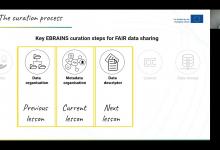FAIR Workflows for Neuroscience Research
FAIR Workflows for Neuroscience Research
To address the question of what anatomical structures and physiological processes in the human brain give rise to consciousness would require countless studies, and critically, the aggregation of data across them. Yet, the lack of infrastructure to aggregate results in a consequential way, poses great challenges for researchers to fully understand the extent of a research study - including the experimental context, the methodology, analysis, stability of the results and data. This lesson describes how the development of FAIR workflows will address that need, unleashing the possibility to better understand the ‘hard problem’ of consciousness.
Topics covered in this lesson
- Collaborative neuroscience research
- FAIR principles / PID infrastructure
- Metadata standards and templates for data and project
- Implementing FAIR Workflows project
External Links
Back to the course




